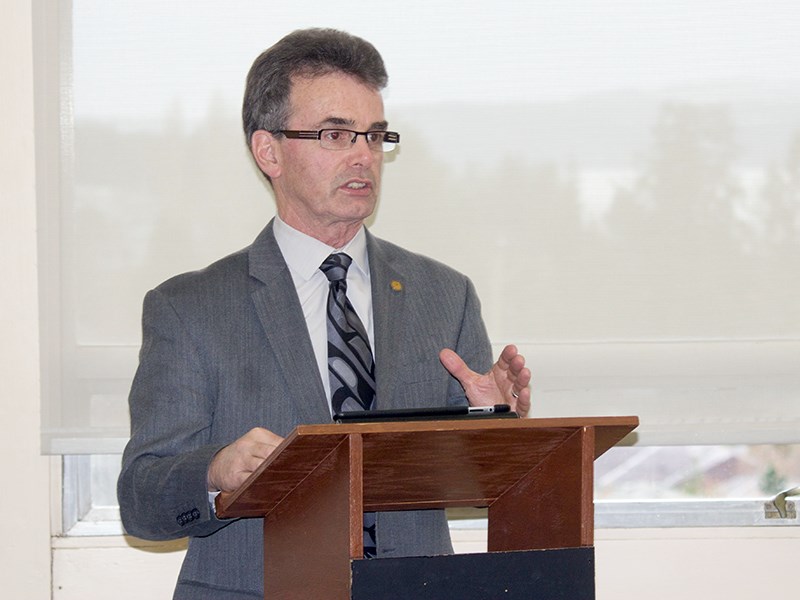City of Powell River is setting plans in motion for regulating legal cannabis sales.
After returning from a meeting with municipal chief administrative officers from across BC, where federal legalization of cannabis was on the table, city chief administrative officer Mac Fraser told committee of the whole at its February 27 meeting that preparation is key.
“We have to be ready for it,” said Fraser at the meeting.
As late as November 2017, cannabis legalization was not a council priority. At the time, mayor Dave Formosa said, “We haven’t discussed it all.”
Now council finds itself with approximately five months to prepare for the first legal sales.
“There will probably be a gathering of council, probably in a workshop form, to get them up to speed as regulators,” said Fraser, “and then decide what questions they want to engage the public in.”
Legalization date is July 1, but the Senate of Canada is currently holding up the legislative process.
Fraser said BC minister of public safety and solicitor general Mike Farnworth anticipates the first licenses will be issued by the end of summer but that it is, at best, an optimistic schedule.
Nobody really knows when it will be legal to smoke marijuana in Canada, but Fraser wants to start laying the groundwork.
Council has to consider six key issues it has control over once pot is legal, including banning retail sales altogether; capping the number of retail outlets; regulating locations through bylaws; security requirements; hours of operation; and regulating public consumption.
Vancouver city councillor and member of the Joint Provincial-Local Government Committee on Cannabis Regulation Kerry Jang said it should all be pretty straightforward.
“Let's give each municipality the ability to determine how it's sold in their community and, to do so, they would use their zoning bylaws,” said Jang. “Both the province and the city have to agree that this particular operator is okay, the province would issue a licence and the municipalities can say where you can sell it in our municipalities.”
More than enough time remains to accomplish everything, according to City of Powell River councillor Maggie Hathaway.
Hathaway said a lot of information will come from other municipalities at an Association of Vancouver Island and Coastal Communities meeting in April, where she hopes delegates will discuss a uniform approach for communities across the province.
“It should be that local governments have, if not exactly the same, similar bylaws,” said Hathaway.
What is not so cut and dried is the biggest concern for cities: the cost. Cities want a piece of the action to offset pressure on police and social supports.
“The cut on the sales tax is important, because why would a municipality commit to a certain regulation if it didn't have the resources to do it?” said Fraser, “I don't think in this day and age it's very acceptable to raise general taxation through property tax to regulate a specific commercial activity.”
Some municipalities want their cut to be 50 per cent; others want even more.
“That's a detail that's going to be quite fascinating to the municipalities,” said Fraser. “How much and how is it calculated? Is it going to be a straight percentage of total provincial take or is it going to be tied to the individual outlet?”
The type of model and enforcement scheme ultimately adopted by the province will impact revenues required to support it, according to a report on cannabis legalization and regulation in BC submitted by the Union of BC Municipalities (UBCM) in November 2017.
Jang said one expense that will not be shouldered by communities is enforcement.
“The cost for enforcements will largely be born by the province with their own pot inspectors,” said Jang, “making sure people are in compliance with the licenses.”
Farnworth suggested provincial enforcement is the direction the government might take. He said the province is aware of the desire from local governments for revenue sharing from cannabis sales, and that the government is working with UBCM on the issue, including enforcement that, if left up the municipality, would create significant pressures.
"There are a number of factors that will go into it," said Farnworth. “If enforcement is done by the province, that would remove a significant burden off of local government.”
A lot still needs to be worked out on every level and there will be an adjustment for police locally, according to Powell River RCMP sergeant Kevin Day.
Day said dealing with people driving under the influence of marijuana would place pressure on police, in part, because more hours are put into those investigations.
“And we're waiting to hear more as far as any device to detect the level of THC,” said Day. “We're still waiting to hear if we'll have something in place by when it's legalized.”
In addition to the tax share, Fraser said public consumption is another area to consider.
“It might be as simple as the same rules as distance from a door as smoking is now,” said Fraser. “But if council seemingly has the authority to take it further than that, that's going to be a new enforcement game for us. My expectation is we'll seriously consider matching the public consumption rules for smoking.”
Fraser also touched on four cannabis dispensaries currently operating unlawfully in Powell River.
“They have no special status; they have no advantage because they're in business and, likewise, they have no disadvantage,” said Fraser. “Our lawyers have said it is in the realm of the possible for council to say it will not positively support an application and approve it back to the [BC Liquor Control and Licensing Branch] for an existing unlawful operation. That's a question for council.”



